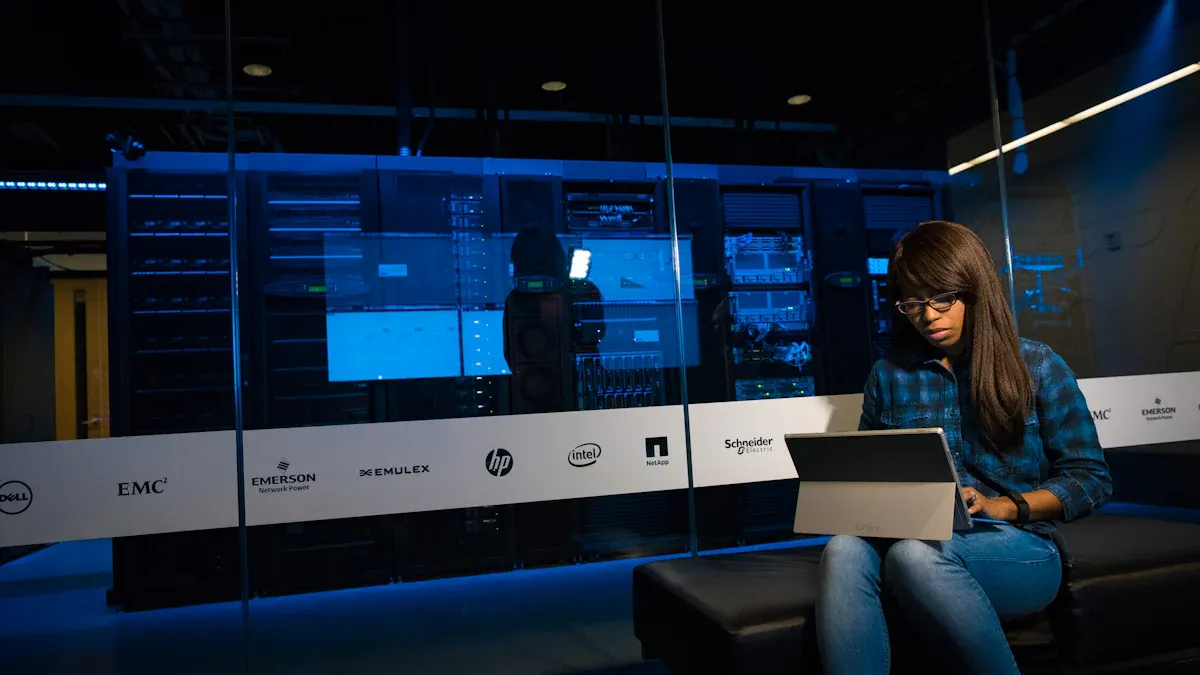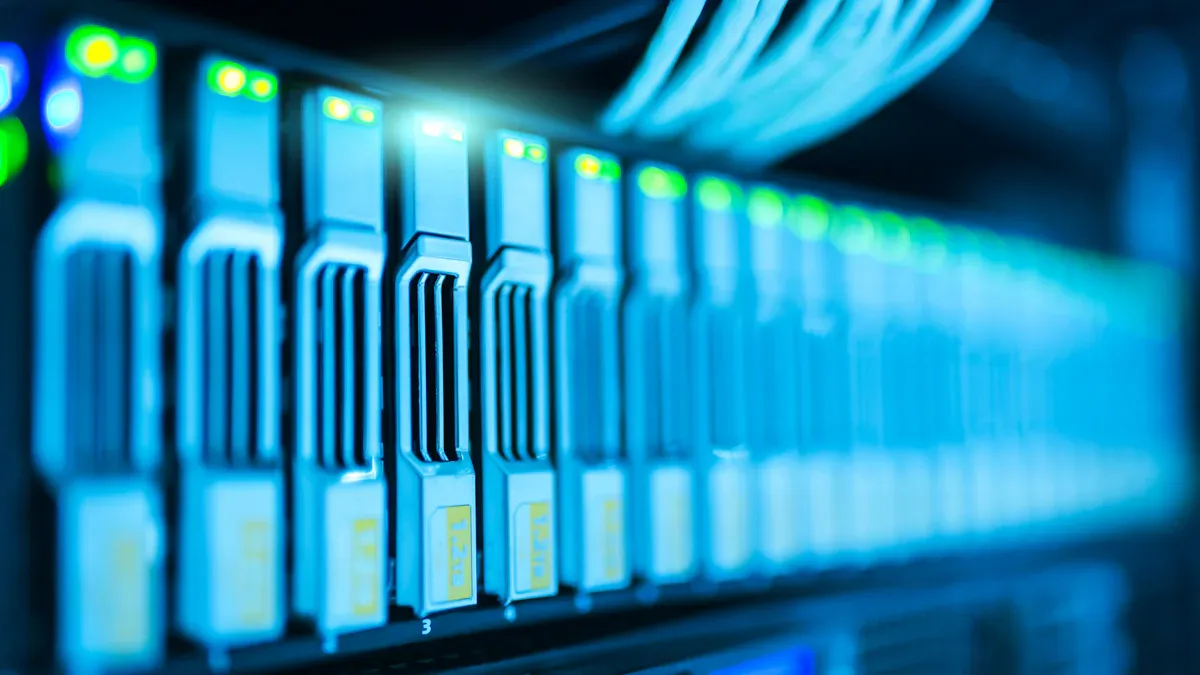© Copyright – 2010-2023 : All Rights Reserved. Sitemap
Power Distribution Unit PDU, rack mount PDU, PDU data center, Smart PDu, intelligent PDU
Power Distribution Unit PDU, rack mount PDU, PDU data center, Smart PDu, intelligent PDU
DTI-CX 2025 Digital Transformation Indonesia Conference, DATE:6-7 AUG.2025, Booth No.: C21

Upgrading to intelligent PDUs is essential for enhancing operational efficiency and reducing costs in 2025. Power system failures cause nearly half of all data center outages. This investment ensures your facility is prepared for increasing power densities and future technological shifts. The market for these devices shows strong growth, highlighting their importance for resilient power distribution. Smart PDUs, along with other solutions used in a PDU datacenter environment and developed by leading PDU manufacturers, deliver immediate ROI through remote management, precise power monitoring, and improved uptime.

A smart power distribution unit gives administrators complete command over their power infrastructure from any location. This remote power management simplifies operations. It reduces the need for on-site staff for routine tasks. Operators gain a central interface to monitor and control the entire power distribution chain. This leads to greater efficiency and significant cost savings on labor. It empowers teams to manage the facility’s power distribution with precision and confidence.
Frozen servers no longer require a technician to travel to the data center. With a smart PDU, administrators can remotely cycle power to an individual outlet. This action immediately reboots an unresponsive device. It eliminates travel delays and speeds up fault response.
This capability can reduce Mean Time to Repair (MTTR) by up to 66%. It allows IT teams to troubleshoot and resolve issues from anywhere, restoring service in minutes instead of hours.
Proper power sequencing is critical for equipment safety. Smart PDUs allow operators to define the specific order and timing for powering up outlets. This controlled startup prevents massive inrush currents that can trip breakers or damage sensitive electronics. It is especially important when restoring power after an outage or bringing a new rack online. This feature ensures a stable power distribution environment and provides a reliable backup procedure.
Smart PDUs enhance security by controlling who can access power. Administrators can assign specific permissions to each user for every outlet. This feature prevents unauthorized personnel from turning off critical equipment. It also stops accidental disconnections. Different types of pdu in data center offer robust security protocols to protect the power infrastructure. This granular control over the power distribution unit ensures that only authorized individuals can manage critical loads, securing both primary and backup power sources.
Effective management of data center power usage is a top priority for reducing operational expenses. Smart PDUs provide the granular data needed to achieve significant savings and boost efficiency. Real-world examples show the immense financial impact. Cisco, for instance, projects saving over $8.6 million annually on electricity by using smart PDUs. This technology transforms power distribution from a fixed cost into a managed resource. Optimizing data center power usage directly improves the bottom line.
Many facilities waste energy on underutilized or “ghost” servers. These devices consume power without performing useful work. A typical server rack can draw between 7 to 15 kW, so even a few inefficient servers can inflate costs. Smart PDUs solve this problem.
Colocation providers must bill clients accurately for their specific data center power usage. Smart PDUs with outlet-level metering make this simple and fair. These different types of pdu in data center ensure that providers can move beyond flat-rate billing to a more profitable usage-based model. This precise power monitoring builds client trust and creates a new revenue stream from power distribution.
Smart PDUs can achieve 1% billing grade accuracy. This precision allows a data center to charge clients for the exact amount of energy they consume, eliminating disputes and improving financial transparency.
Power Usage Effectiveness (PUE) is the key metric for data center efficiency. A lower PUE ratio means less energy is wasted on non-IT functions like cooling. Improving PUE requires accurate data on IT equipment power consumption. Smart PDUs are the ideal tool for this, measuring data center power usage directly at the rack. This granular monitoring provides the most precise data for Level 3 PUE calculations. With this information, operators can identify power leaks, refine cooling strategies, and enhance overall power management. This leads to more efficient power distribution and a greener, more cost-effective operation.
Intelligent PDUs are a cornerstone of data center reliability. They provide the tools to prevent downtime before it happens. Proactive monitoring and automated alerts give operators the foresight needed to maintain continuous operation. This transforms power management from a reactive task into a strategic defense for your facility’s uptime.
Operators can define specific thresholds for power and environmental conditions. This provides automated protection for critical hardware. Setting these limits is essential for safe power distribution. The National Electrical Code suggests a default capacity limit of 80%. For best practice:
Environmental monitoring is just as critical. Smart sensors can trigger alerts for conditions that threaten equipment.
Immediate notifications are key to rapid response. Smart PDUs use standard protocols to deliver real-time alerts. Simple Network Management Protocol (SNMP) allows for centralized remote monitoring. It gathers data from all network devices and sends it to a management platform. This gives administrators a complete view of network health. Email is another effective channel for notifications.
Critical alerts sent via email can include updates on circuit breaker status, unbalanced loads, voltage fluctuations, and power consumption levels. This ensures the right people are informed instantly when an issue arises.
Smart PDUs do more than just report current status; they enable predictive maintenance. They collect historical data from power monitoring. Advanced algorithms analyze this monitoring data to identify patterns. These patterns can predict equipment failures before they occur. This data-driven approach allows for smarter maintenance scheduling. It enhances equipment protection and ensures a reliable power backup. This form of proactive management strengthens the entire power distribution chain, turning historical data into a tool for future reliability and a solid backup strategy.

A forward-thinking power strategy prepares a data center for tomorrow’s challenges, including rising energy costs, capacity planning, and the need for constant uptime. Upgrading the power infrastructure is not just about meeting current needs; it is about building a resilient and adaptable foundation for the future. This ensures the facility can handle technological shifts and increasing demands without costly overhauls.
The rise of artificial intelligence (AI) and high-performance computing (HPC) is driving a massive increase in rack power density. Modern data center designs now often require over 100 kW per rack, creating immense thermal and electrical challenges. Specialized types of pdu in data center are engineered to manage these extreme loads. They support high power capacities up to 57.6 kVA and provide detailed, outlet-level metering. This allows operators to balance loads and prevent overloads. They also integrate environmental sensors to manage the intense heat generated, ensuring optimal equipment performance and reliable power distribution.
As facilities scale, monitoring becomes fragmented across different systems that lack a common interface. Smart PDUs solve this problem by integrating directly with Data Center Infrastructure Management (DCIM) software. This connection consolidates power and environmental data into a single platform.
This centralized data center management approach provides real-time dashboards and reports. Operators can analyze data center power usage, track capacity, and optimize the power distribution network from one location.
This unified view simplifies operations and enables more accurate forecasting for future needs.
Intelligent PDUs with modular designs are essential for scalable growth. These systems allow operators to add or change power components without disrupting the entire data center. This adaptability is critical for long-term planning and cost control. A modular approach helps operators:
This plug-and-play capability makes the power infrastructure flexible. It supports efficient power distribution and prepares the facility for future demands. Investing in these flexible types of pdu in data center is a strategic move for long-term success.
Upgrading a power distribution unit delivers clear advantages in control, cost savings, and reliability. The data center industry faces new challenges from AI and grid limitations. Investing in intelligent pdus is a strategic move for any modern data center to thrive in 2025. Managers should begin planning now to stay competitive.
First Steps for Your Upgrade:
A basic PDU simply distributes electricity. A smart PDU provides advanced features. These include remote outlet control, detailed power monitoring, and automated alerts. This functionality gives operators greater command over their power infrastructure and improves efficiency.
Smart PDUs provide outlet-level power data. This information helps managers find underutilized or “ghost” servers. Teams can then decommission this hardware. The action directly lowers electricity consumption and operational expenses for the data center.
Yes. Smart PDUs use standard connectors and protocols like SNMP. They integrate easily with existing server racks and network hardware. Many models also connect with DCIM software. This creates a unified management system for the entire facility.
Remote rebooting allows administrators to cycle power to unresponsive equipment from any location. This feature eliminates travel time for technicians. It significantly speeds up service restoration and reduces costly operational delays, improving overall uptime.
A Professional And Leading Manufacturer
For OEM
& ODM Power Distribution Unit (PDU)
You Can Trust
CONTACT
Ningbo YOSUN Electric Technology Co., LTD
Leading Professional Manufacturer in PDU Power Solutions
Contact Info.